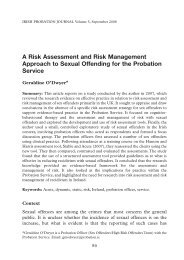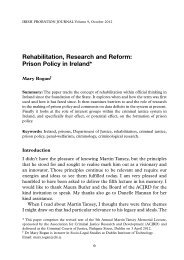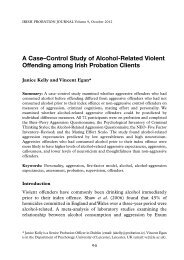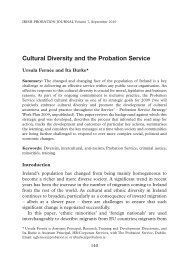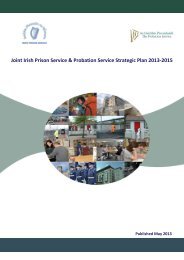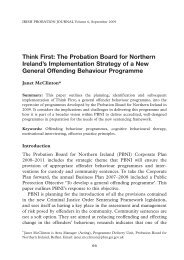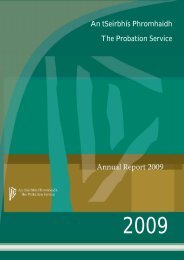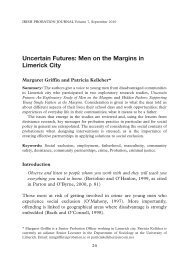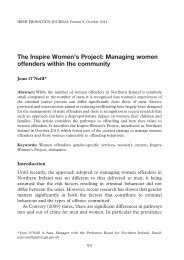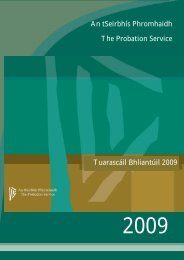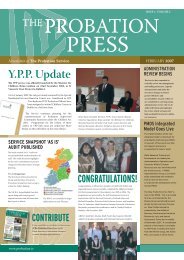Perceptions Of Restorative Justice In Ireland - The Probation Service
Perceptions Of Restorative Justice In Ireland - The Probation Service
Perceptions Of Restorative Justice In Ireland - The Probation Service
Create successful ePaper yourself
Turn your PDF publications into a flip-book with our unique Google optimized e-Paper software.
<strong>Perceptions</strong> of <strong>Restorative</strong> <strong>Justice</strong> in <strong>Ireland</strong> 193<br />
<strong>Restorative</strong> justice and change in offenders’ behaviour<br />
I enquired whether survey participants believed a system of RJ could<br />
cause offenders to change their behaviour. <strong>The</strong> answers reflected a<br />
disparity of opinion among practitioners; remarkably, some of those who<br />
had previously seen no merit in the concept of RJ identified some<br />
circumstances in which it might be successful in causing offenders to<br />
change their behaviour.<br />
One respondent stated that in his view a lot of crimes were committed<br />
by persons when under the influence of drink or drugs. <strong>The</strong>se people, in<br />
his opinion, when they are sober and confronted with the damage they<br />
have caused could be motivated to change. This comment is particularly<br />
relevant when one considers that alcohol consumption is a major factor<br />
in many cases processed by the <strong>Restorative</strong> <strong>Justice</strong> <strong>Service</strong>s reparation<br />
panel programme in Tallaght: 85% of offenders there undertook some<br />
form of alcohol awareness programme arising from meeting with the<br />
reparation panel (DJELR, 2009a, p. 47). <strong>In</strong>ternational studies have<br />
found that offenders who have participated in RJ programmes have a<br />
12% lower recidivism rate than offenders who did not participate in such<br />
programmes (O’Mahony and Doak, 2008).<br />
An alternative viewpoint was given by the District Court Judge<br />
interviewed, who felt that it was unrealistic to expect drinking alcoholics<br />
or persons addicted to hard drugs to engage fully in an RJ programme<br />
while they are still addicted.<br />
<strong>Restorative</strong> justice in practice<br />
25% of solicitors in the survey thought that bringing the offender and<br />
victim together in a supervised setting was a bad idea, stating that ‘<strong>The</strong>re<br />
would be war’ and ‘I think it would be just a bad idea’. This seemed to<br />
ignore the fact that in many Court cases, apart from criminal law but<br />
including family law and commercial disputes, the respective sides may<br />
meet. Mediation and arbitration meetings are seen as commonplace and<br />
are not significantly different from the principles of RJ. A further notable<br />
feature in the answers is that the three solicitors who had a pre-existing<br />
good knowledge of what RJ entailed all expressed positive views of the<br />
benefits of a process of RJ meetings between the parties.<br />
<strong>In</strong> my interview with a District Court Judge I asked what he felt were<br />
the barriers to RJ being incorporated into the mainstream criminal



